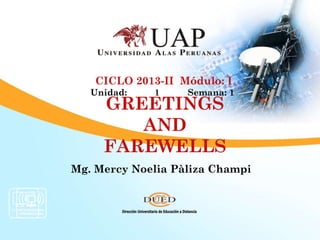
Introducing greetings and farewells ingles 1 unit1
- 1. GREETINGS AND FAREWELLS Mg. Mercy Noelia Pàliza Champi CICLO 2013-II Módulo: I Unidad: 1 Semana: 1
- 2. GUIDELINES Review your guide Review your book Listen to the cd.
- 3. TEMATIC CONTENTS INTRODUCING THEMSELVES
- 4. In this unit will learn to introduce EXPECTED LEARNING
- 5. Buenos días.** (o más informalmente Morning) Greetings(Formal)
- 6. Good Morning Good Afternoon Greetings(Formal)
- 8. Good morningGood afternoon Good night Good evening Tell me: What picture is in theTell me: What picture is in the A B C C D E Good morning Good morning Greetings(Formal)
- 9. Hello Hi Hi there Greetings(Formal)
- 10. Good evening es buenas noches en cualquier situación Hi there !tiene el mismo significado que Hi! Usted ha aprendido los saludos formales e informales. A continuación le explicamos algunas excepciones Usted ha aprendido los saludos formales e informales. A continuación le explicamos algunas excepciones Greetings(Formal)
- 11. En inglés el verbo viene siempre precedido por el pronombre personal (sujeto de la oración). En castellano no ocurre lo mismo: al comenzar una oración podemos decir soy, estoy (sujeto tácito o implícito) en reemplazo de yo soy, yo estoy. Hello. (más formal), Hi. (menos formal), Hey. (muy informal) - Hola. Hey! - ¡Oye!/¡Oiga!/¡Oigan!/¡Oíd! (aquí no es saludo sino una forma de atraer la atención How's it going? - ¿Qué tal?/¿Cómo te va? (o más informalmente What’s up?) How are you? - ¿Cómo estás?/¿Cómo está Ud.? How are you all? -- ¿Cómo estáis?/¿Cómo están Uds.?¿Cómo estáis?/¿Cómo están Uds.? Greetings (informal)Greetings(Informal)
- 12. Good Bye See you later See you soon Good night Good Bye See you later See you soon Good night FAREWELLS (Formal)
- 14. Good Night se utiliza para las despedidas La expresión see you se puede utilizar con : - later - Tomorrow - soon FAREWELLS
- 15. My Name is ________ This is my friend Merly Nice to meet you Nice to meet you, too How are you ? Fine thanks Introducing Oneself
- 16. Recuerde cuando quiere presentar a alguien utilice la expresión This is Ejemplo: This is Patty Recuerde cuando conoce a alguien, usted puede utilizar la expresión Nice to meet you Y cuando le responden usted expresa Nice to meet you usted debe responder Nice to meet you, too Si usted quiere saber como se encuentra alguien usted podrá preguntar How are you!,How do you do?, How is it going?, How`ve you been_? Para responder la pregunta anterior usted puede utilizar las siguientes expresiones Fine Thanks, I am O.K. (informal)
- 22. WRITE THE CORRECT GREETING UNDER EACH PICTURE
- 32. You have learned the most comun expressions that is used for introducing
- 33. THANKS
